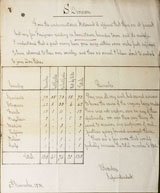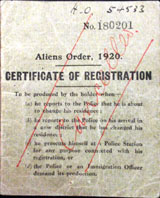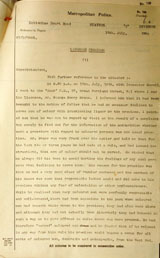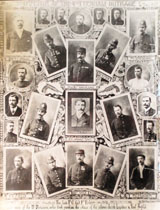Crime and Ethnicity
The police not only targeted those termed as the 'criminal classes', foreigners came to their attention too. The Irish were not strictly 'foreigners' during the nineteenth century as Ireland was united with the rest of Great Britain and ruled by the British Crown. Irish districts of the metropolis, however, were regarded as rough and violent by both the population and the police that patrolled them. The police officers that accompanied Charles Booth's investigators for his great turn-of-the-century survey of London and Londoners spoke warily of the streets occupied by 'Irish Cockneys'. When Jewish immigrants came in the late nineteenth century, escaping from pogroms in the Russian Empire, they were also viewed with suspicion. But, again according to police informants of Booth's investigators, not because they were violent, but because they appeared tricky. The police problems were aggravated by the fact that, until a course was established in 1905, none of them understood Yiddish. Some of the Jews were political activists, socialists who sought the overthrow of the Tzar and other monarchs.

London served as a haven for political refugees throughout the nineteenth and early twentieth centuries and the police had to maintain surveillance of their activities. Superintendent Carden's report refers to the Somers Town area of London, which is located between Euston and St. Pancras stations today. As you can see, the Spanish make up the largest immigrant community. The Spanish arrived around 1823; they were mainly opponents to the absolutist monarchy of Ferdinand VII (1814-33). You might consider whether the superintendent appears sympathetic to the presence of these foreigners? And if not, why not? A key sentence in his October report is:
Several had females with them (English) and I am inclined to think that many of them are supported by those women.
The introduction of minor immigration controls in the early twentieth century extended the police role. In particular, the Aliens Act of 1905 facilitated the expulsion of 'improper and scandalous foreigners'. The Aliens Act only allowed entry to the country at authorized ports, and immigration officers were given powers to refuse entry to 'undesirables'. Magistrates could recommend the deportation of foreigners convicted of offences linked to prostitution. Furthermore, aliens convicted of crime could be deported if they were not able to support their families or themselves. They could also face deportation if they fell destitute within twelve months of arrival or were wanted for an extraditable crime.

These regulations were strengthened by the Aliens Restriction Act 1914, which granted the government powers to make orders to restrict and prohibit the entry and departure of aliens, deport aliens, or make them live in specified areas and comply with requirements, such as registering with the police. The Aliens Restriction (Amendment) Act 1919 repealed the legislation of 1905, extending the wartime measures for one year. The 1914 and 1919 Acts were renewed annually until 1971. Under the latter legislation, the Aliens Order 1920 granted the Home Secretary the power to deport any alien whose presence was deemed not conducive to the 'public good'. This document is a certificate of registration from 1923 which all foreigners had to possess.
In the inter-war years the authorities were concerned with the activities of foreign prostitutes in London, and their links with pimps and other criminals. While foreign prostitutes were in a minority when compared to the total number of prostitutes in London, they constituted, in official eyes, a special threat that needed special attention. Thus on 23 April 1936 authorization was granted for the compilation of detailed photographic albums of all known foreign prostitutes and their associates. Particulars included a photograph and name, nickname, maiden name, address, and places frequented. If relevant, a criminal record number and details of previous convictions were noted. Also listed were known associates. This is a sample page from the The Secret Foreign Prostitutes and Associates Album, which listed 102 prostitutes for 1936-7.

London's role as an imperial city also meant that a number of non-white people were present in London. While the police have been charged with 'institutional racism', the report relating to a fight in 1945 is striking in that the police take the word of the 'coloured' civilians against the US troops. However, the police had assumptions about the inherent behaviour of the races. There is no doubt that many non-whites faced racial discrimination in the pre-war years, though the police could be impeded from acting. In the following case Sir Cosmo Parkinson, from the Colonial Office, wrote to the Police Commissioner to complain that the Ceylonese (Sri Lankan) Trade Commissioner had been refused service in a pub due to his skin colour. The police reported that while they were sympathetic to the plight of the gentleman involved, there was little that they could do. The actions of the landlord were excused by the belief that the presence of 'coloured men' was offensive to the white female clientele.
 Souvenir of the Tottenham outrage
Souvenir of the Tottenham outrage